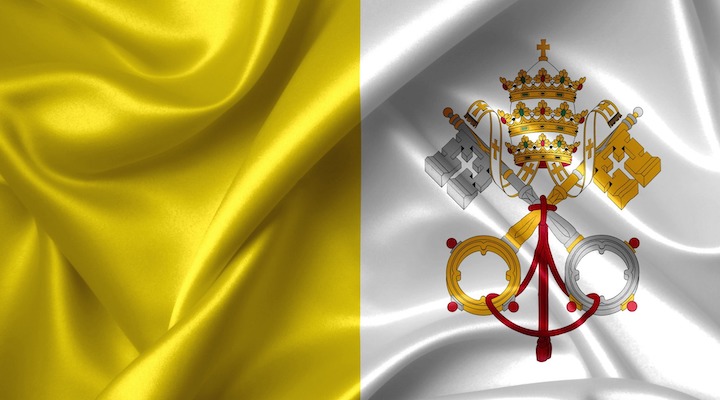I have a friend who came out to me recently – as a Catholic. “I identify as Catholic,” she told me. “I didn’t know there was a name for what I was at first, and I grew up in a community that was constantly mocking Catholics. But deep down, I always knew I was different. And when I found people who were out and proud, I found myself.”
“What pronouns do you use?” I asked her. “All of them,” she replied with a quizzical look. “It depends upon the sex and number of people to which I am referring.” She grew up with a Jewish father who was an editor and a Christian mother who was a school teacher. Her grandfather was a Jewish émigré who made a living as a writer. As a result, she just can’t bring herself to write “Everyone has their book” rather than “Everyone has his book.” “If I wrote it the other way, I would hear my mother groaning in my head.” Nor can she call a single person “they.” “It’s just the way I was raised,” she explains. “I hope people can respect my culture.” When addressing her, she prefers “Mrs.” or “Yes Ma’am.”
She can take a good-natured joke about Catholics, but noting the long history of discrimination against them, most jokes or jibes at the expense of Catholics she considers odious and should be avoided. She is opposed to any and all discrimination against Catholics, naturally, whether in housing or jobs. It would be no more acceptable to her for someone to say to a job applicant, “But Miss X, you’re Catholic,” than it would be to say, “But Miss X, you’re gay.”
She considers it as discriminatory for someone to ask, “But Mrs. X, how could you be a fair-minded federal judge, you’re Catholic?” as it would be to ask, “How could you be a fair-minded federal judge, you’re gay?” She considers people ignorant who would say, “We would like to hire you, but it is just too controversial these days to hire someone who is so openly Catholic.” If that seems odd, just insert the word “gay” for “Catholic,” and you’ll get the idea. She believes these are impermissible and immoral acts of discrimination that must stop.
Since she has come out at as a Catholic, she now makes clear to people that she does not appreciate (or tolerate) the usual crude jokes and bigoted comments people often make about Catholics. And if people speak about sexuality in a casual or coarse way in her presence, she considers this a form of aggression and a violation of her safe space.
She wears her wedding ring very openly, so she considers it extremely rude if any man makes suggestive comments or tries to “hit on her” in a bar. She sees no reason why she shouldn’t be able to visit bars and cafés like every other woman and be able to sit there in peace without be accosted by men who don’t respect her sexual preferences – that is to say, her preference for sexual relations with just one man who is her husband.

Some bigoted people seem to think that she should just stay out of the bar if she isn’t interested in hooking up. But she sees no reason why their sexo-centric orientation should somehow trump her non-sexo-centric orientation.
She likes to talk about philosophy, politics, and religion, and sometimes baseball. And she can’t understand why talk about men and how they look in tight jeans should be considered the default topic of conversation among women. She has found tremendous support for her preferences in this area since she has come out as a Catholic, from women and even from some of the men she has met. She tells me that these people have been tremendously supportive in helping her realize her new Catholic identity.
I knew this woman when she was younger. She said she could never be Catholic. I tried to be understanding and not laugh. But I knew. Most of us knew. That unshakeable desire for truth. We would shake our heads, point to her, and whisper, “Catholic.” It was only a matter of time. I can remember a friend of mine who said that she just needed to spend a little time with others in the community, and she would come out. And sure enough, she did. I’m not saying it’s biological. It’s a choice. But sometimes, you just know.
Her coming out has been hard for some of her more narrow-minded friends, but you know, when you love someone, you just have to accept them for who they are. And she’s made it clear: she is a Catholic. I just hope everyone can put their petty prejudices aside and support her in this brave decision.
Too many people these days are Catholic and just don’t want to admit it. There’s so much pressure to conform and just “fit in” with society. Go to the parties. Drink heavily. Talk about sex like it was a football game or a chess match – as if it were some sort of power struggle. Be crude and indifferent. Disrespect your parents.
But my friend has chosen a different path. It may not be for everyone, but all she is asking for is acceptance. I hope people can support her in her decision as she accustoms herself to this new, liberating sense of self.
My friend has a tremendous talent for organizing, and she has been thinking recently about organizing something she calls “Catholic Awareness Week” to help raise awareness of the history of discrimination against Catholics and to educate people about what it really means to be a Catholic. Moreover people around the country could fly the yellow Vatican flag from their windows everywhere to demonstrate their solidarity with Catholic values and principles and to show that they refuse to discriminate.
How could anyone object to that?















